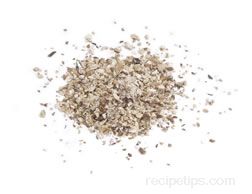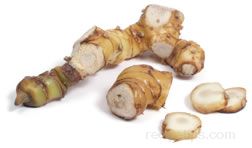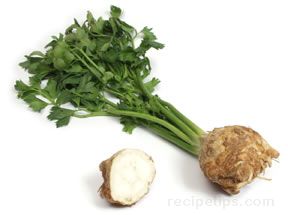The root is similar in size, shape and preparation methods to a carrot and can be used for soups, stews, braised as a vegetable side dish, or stir-fried with other vegetables and grains. It is also ground into bits to be added to foods as a health supplement or to be brewed into tea beverages. To prepare, wash the roots under cold water to thoroughly remove all dirt and particles. If desired, peel the thin outer skin away from the flesh. After being peeled, the Burdock Root should be cut into desired lengths and placed in water to preserve the freshness and light color until it is ready to be cooked. When exposed to air, the flesh begins to darken. The Burdock Root can also be prepared without being peeled. When cooked with the outer skin on, this root is more flavorful and sweeter tasting. The Burdock Root is also known as gobo, the Japanese word for the edible burdock, as well as butterbur and beggar's bottom.
Loading
Burdock Root
A root vegetable that comes from the Burdock plant a member of the thistle family, which can be readily identified by the large green unsplit and wavy leaves with tall bare stalks. The variety commonly considered to be a nuisance weed (Arctium lappa) is the wild Burdock that is not the root chosen for eating. It is the cultivated variety (Arctium lappa, var. edule) common in Japan and China that is favored for its texture and flavor. The root grows to an average diameter of 1 inch and extends into the soil 2 or 3 feet. When dried, the Burdock Root has a thin, light tan colored, wrinkled outer skin covering a crisp and tender-textured, but chewy flesh. When cooked, this root vegetable is often compared in taste to scorzonera, black salsify or artichoke hearts, provding a somewhat robust and earthy flavor. A nutritious and delicious root vegetable high in fiber, it is a plant that is believed to provide herbal healing properties to assist with indigestion, arthritis, rheumatism, some skin or nervous disorders, and other ailments.
USDA Nutrition Facts | |||||||||||||||||||||||||||||||||||||||||||||||||||||||||||||||
|
|||||||||||||||||||||||||||||||||||||||||||||||||||||||||||||||
There currently aren't any reviews or comments for this term. Be the first!
Advertisement
Advertisement













